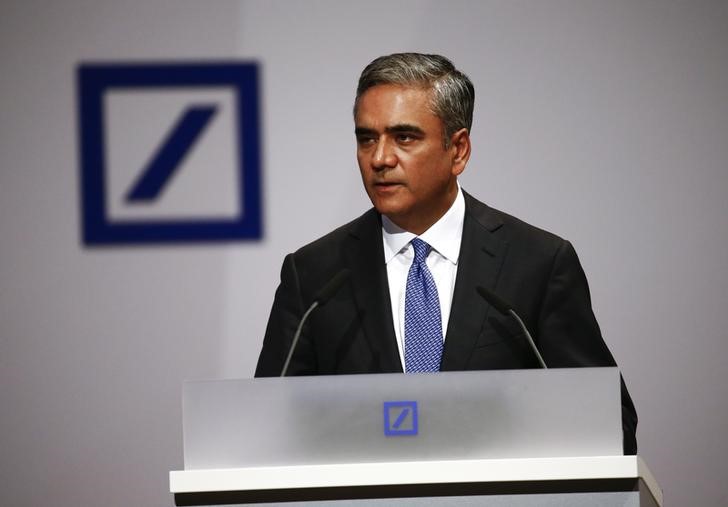By Kathrin Jones and Alexander Hübner
FRANKFURT (Reuters) - A stinging rebuke for Deutsche Bank 's (DE:DBKGn) leaders in a shareholder vote piles pressure on co-Chief Executive Anshu Jain to deliver a convincing strategy in a restructure of Germany's biggest lender in two months' time.
Deutsche Bank's executive board, Jain and co-CEO Juergen Fitschen included, garnered the support of little more than 60 percent of voting capital represented at the annual shareholder meeting on Thursday..
That approval rating slumped from 89 percent last year and the high 90s -- typical for blue chip firms -- just three years ago.
"For a DAX-30 company, this is really unprecedented," Klaus Nieding of investor advocate group DSW said of the vote.
While low shareholder backing does not carry an automatic consequence for the bank's executives, the record at other leading German companies serves as a warning.
At Siemens (DE:SIEGn) in 2007, CEO Klaus Kleinfeld won 71 percent backing and chairman Heinrich von Pierer 66 percent after the engineering conglomerate was engulfed in a bribery scandal. Both were out of office within six months.
ThyssenKrupp (DE:TKAG), rocked by a multi-billion-euro writedown following the botched sale of its steel business in the Americas, saw CEO Heinrich Hiesinger survive with 63 percent backing, but Chairman Gerhard Cromme resigned two months after a shareholder vote in 2013.
Low votes are a clear sign of shareholder dissatisfaction, said Franz-Josef Leven of shareholder lobby DAI, but too much can be read into them.
"They are extremely exceptional. But if a big shareholder wants a change in the board, it would use a different means," Leven said.
Deutsche Bank's Chairman, Paul Achleitner, working to guide the lender through a painful restructuring, eye-popping fines from financial regulators and a raft of legal entanglements, would not be drawn on the impact of the vote.
"You must understand that I will not comment so soon after the shareholder meeting," he told Reuters late on Thursday.
JAIN FACES CHALLENGES
Making Jain directly responsible this week for cutting Deutsche Bank's costs by 4.7 billion euros ($5.2 billion), selling its Postbank (DE:DPBGn) retail business and paring back its investment bank puts huge pressure on the former trader.
Jain is due to present details of the reorganisation by the end of July.
The plan to boost profitability and strengthen Deutsche Bank's balance sheet by axing laggard business lines was heavily criticised by investors as being too little, too late when it was outlined on April 27.
Deutsche Bank shares have fallen 11 percent since April 14, when details of the review started to emerge, underperforming the European banking index (SX7P) by 13 percent.
Jonathan Fearon, Investment Director in the European Equities team at Standard Life (LONDON:SL) Investments, one of Deutsche Bank's 40 largest shareholders, said investors would be looking for swift evidence that Jain and the newly reshuffled management team could deliver on pledges to cut costs.
"The ability to control costs within the delivery of the Strategy 2020 plan is likely to be the highest priority key performance indicator by which the entire management team is judged," he said.
A representative of one of Deutsche Bank's Top 10 shareholders, who is not authorised to comment publicly on the lender, said there were only two key issues following the shareholder vote -- that Jain deliver on his goals and that calm return to the lender.

"However, that does not rule out that there could be more extensive changes in the board this year," the representative said.